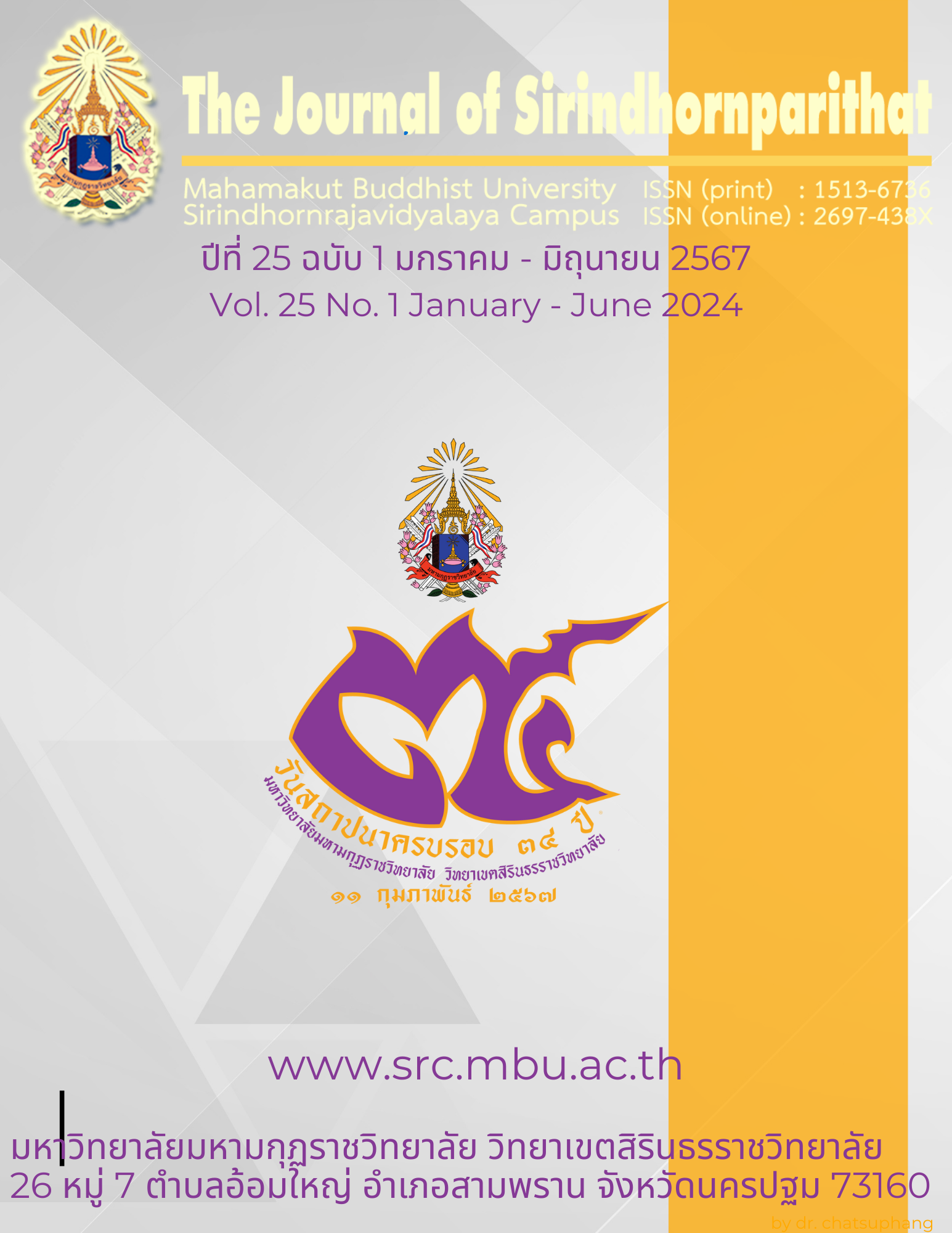Administrative Skills of School Administrators in the 21st Century Affecting Teacher Performance under the Office of Secondary Education Service Area Bangkok Area 1
Keywords:
Administrative Skills of School Administrators in the 21st Century, Teacher performanceAbstract
This research aims to study the level of school administrator skills in the 21 century, the level of performance of teachers, and the skills of school administrators in the 21 century that affect the performance of teachers. Under the office of Secondary Education Service Area Bangkok Area 1 Investigators collected data from the above 67 school questionnaires, delivering questionnaires to 373 schools, receiving 373 complete questionnaires, 100 percent of which were analyzed by prefabricated computer programs. The statistics used are percentage, average, standard deviation. Correlation coefficient and step-by-step multiple regression analysis the research found that 1) the level of school administrator skills in the 21 century that affected the performance of teachers. Under the office of Secondary Education Service Area Bangkok Area 1 overall and on the most extreme level, sorted in descending order, namely information technology and digital skills. Human relations skills, technical and collective thinking skills, respectively, 2) Teacher performance level Under the office of Secondary Education Service Area Bangkok Area 1 has the highest level of overall and individual practices, sorted in descending order: being a virtuous, ethical, knowledgeable, knowledgeable role model, using information technology for communication and using digital technology for education, respectively, and 3) institutional administrator skills in the 21 century that affect teacher performance. Under the office of Secondary Education Service Area Bangkok Area 1, sequentially into the equation from the analysis. Multiple regressions or forecasting equations include the conceptual thinking skills (X4), information and digital technology skills (X1), intersopular skills (X3), and technical skills (X2), respectively, statistically significant at .01 Forecast efficiency (R2) = .631 is 63.1 percent.
References
ชัชมา เทพวรสุข. (2553). การศึกษาทักษะการบริหารของผู้บริหารสถานศึกษาตามทัศนะของครู สังกัด
โรงเรียนประถมศึกษา อำเภอมะขาม จังหวัดจันทบุรี. งานนิพนธ์การศึกษา มหาบัณฑิตสาขาวิชาการบริหารการศึกษา. บัณฑิตวิทยาลัย. มหาวิทยาลัยบูรพา.
ณรงค์ชัย บุญประเสริฐ. (2563). ความสัมพันธ์ระหว่างทักษะการบริหารสถานศึกษาในศตวรรษที่ 21 กับประสิทธิภาพการปฏิบัติงานของครูและบุคลากรทางการศึกษา สังกัดสำนักงานเขตพื้นที่การศึกษาประถมศึกษาระยอง เขต 1. ปริญญาครุศษสตรมหาบัณฑิต สาขาวิชาการบริหารการศึกษา คณะครุศาสตร์ มหาวิทยาลัยราชภัฏรำไพพรรณี
ณัฐพงษ์ ปรีชานนทกุล. (2563). ทักษะของผู้บริหารสถานศึกษาในศตวรรษที่ 21 ที่ส่งผลต่อการบริหารงานวิชาการสถานศึกษา สังกัดสำนักงานคณะกรรมการการอาชีวศึกษาจังหวัดระยอง จันทบุรีและตราด. ปริญญาครุศาสตรมหาบัณฑิต สาขาวิชาการบริหารการศึกษา. บัณฑิตวิทยาลัย. มหาวิทยาลัยราชภัฏรำไพพรรณี.
แพรดาว สนองผัน. (2557). ทักษะของผู้บริหารสถานศึกษาในศตวรรษที่ 21 สังกัดสำนักงานเขตพื้นที่ การศึกษาประถมศึกษาอุดรธานี เขต 3. วิทยานิพนธ์ศึกษาศาสตร ดุษฎีบัณฑิต สาขาการบริหาร การศึกษา บัณฑิตวิทยาลัย มหาวิทยาลัยขอนแก่น
ศิริญญา ศรีประมวล. (2549). การวิเคราะห์องค์ประกอบของประสิทธิภาพการสอนของครูประถมศึกษา. วิทยานิพนธ์ปริญญาศึกษาศาสตรมหาบัณฑิต (การวัดผลและวิจัยการศึกษา) มหาวิทยาลัยสงขลานครินทร์ วิทยาเขตปัตตานี
สำนักงานคณะกรรมการศึกษาแห่งชาติ. (2545). พระราชบัญญัติการศึกษาแห่งชาติ พ.ศ. ๒๕๔๒ แก้ไข(2564, สิงหาคม 5). สืบค้นจากhttps://www.kruchiangrai.net/2016/11/22/สรุปย่อพระราชบัญญัติกา.

Downloads
Published
Issue
Section
License
Copyright (c) 2024 Mahamakut Buddhist University

This work is licensed under a Creative Commons Attribution-NonCommercial-NoDerivatives 4.0 International License.
บทความที่ได้รับการตีพิมพ์เป็นลิขสิทธิ์ของ มหาวิทยาลัยมหามกุฏราชวิทยาลัย วิทยาเขตสิรินธรราชวิทยาลัย
ข้อความที่ปรากฏในบทความแต่ละเรื่องในวารสารวิชาการเล่มนี้เป็นความคิดเห็นส่วนตัวของผู้เขียนแต่ละท่านไม่เกี่ยวข้องกับหาวิทยาลัยมหามกุฏราชวิทยาลัย วิทยาเขตสิรินธรราชวิทยาลัย และคณาจารย์ท่านอื่นๆในมหาวิทยาลัยฯ แต่อย่างใด ความรับผิดชอบองค์ประกอบทั้งหมดของบทความแต่ละเรื่องเป็นของผู้เขียนแต่ละท่าน หากมีความผิดพลาดใดๆ ผู้เขียนแต่ละท่านจะรับผิดชอบบทความของตนเองแต่ผู้เดียว



